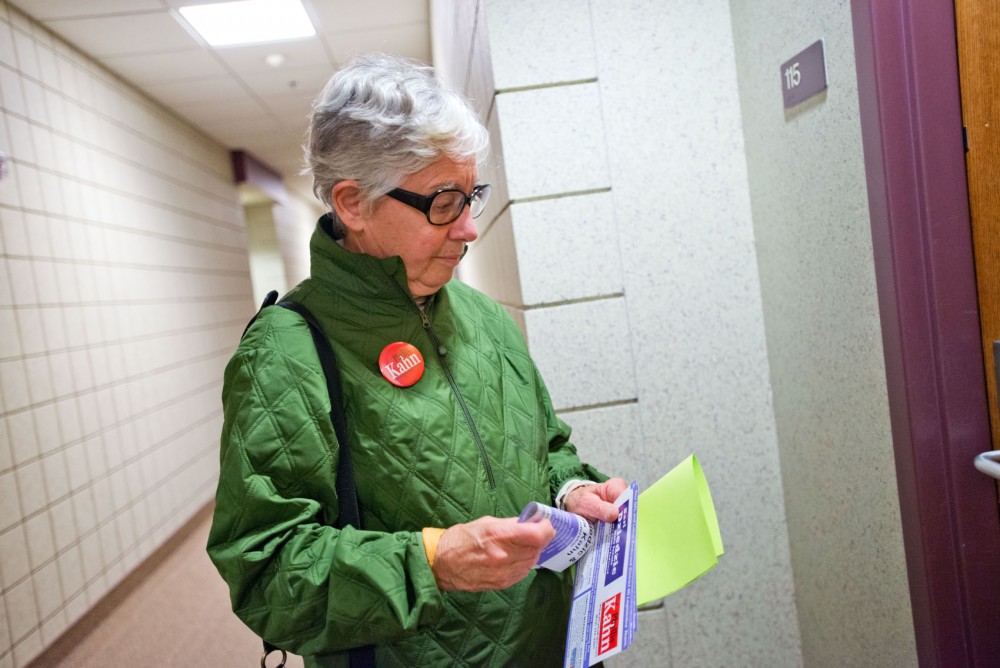Rep. Phyllis Kahn and Sen. Kari Dziedzic are fighting almost nonexistent battles for re-election to the Minnesota Legislature this year.
Along with campaigning for themselves, they’re helping out other candidates and joining the fight against the marriage and voter ID amendments.
“We’ve been working for a lot of the candidates all over the area,” Kahn said.
“It’s much more stressful than when you just have your own race and focus on it. When you’re campaigning for yourself you know what to do.”
The women are running with little opposition in a district that leans overwhelmingly Democratic but are still hitting the streets.
“That’s part of the job, just going out and introducing yourself to people and talking to people,” Dziedzic said. “I just think it’s important, and I actually enjoy it.”
Kahn was elected in 1972 to the House district that covers the University of Minnesota area, and voters elected Dziedzic last winter in a special election for University’s Senate district.
“I think it’s important because campaigning in Minnesota is such a face-to-face effort,” Kahn said. “The thing that makes it particularly important this year is, of course, the amendments.”
Kahn and Dziedzic have been handing out joint campaign literature that discusses both forthcoming amendments and talking with voters about why they should vote no.
Hamline University political science professor David Schultz said races this uncontested are “exceedingly rare.”
Dziedzic’s opposition
Republican Mark Lazarchic and Independent candidate Rahn Workcuff, who ran for state Senate in 2006, will be listed alongside Dziedzic on the ballot, but they haven’t campaigned prominently or even set up a campaign website.
“I’m not putting in any time, I haven’t raised a single dollar, I haven’t knocked on a single door — I haven’t done anything,” said Lazarchic, who said he’s running because the Republican Party asked him to.
“A Republican hasn’t won in my district since 1964; I’m not going to change that,” he said. “I’m not going to suddenly win.”
Dziedzic was elected to the state Senate in January in a special election after Sen. Larry Pogemiller resigned to head the Minnesota Office of Higher Education.
She said that campaign period was more “compact.”
“This is my first in an election, so I’ve been spending a lot of time doing the local stuff and door-knocking the area and going to a lot of events in the area,” Dziedzic said.
Nearly 40 years
Unlike Dziedzic, election time for Kahn is nothing new.
First elected in 1972, the 75-year-old legislator is finishing up her 20th term as representative for the area.
She said campaigning for re-election this year has a different emphasis because it’s the first non-Democratic Senate since she was elected in 1972.
Kahn said she doesn’t see her opponent, Republican Kody Zalewski, as a major contender.
Zalewski, a neuroscience senior at the University, said he thinks he has a fighting chance.
“I feel that by just getting the message and by reaching out to people, I could win a majority of the votes in this district,” Zalewski said.
Kahn faced her biggest opposition when vying for the DFL endorsement in March against University graduate Mike Griffin, who now works with the anti-marriage amendment group Minnesotans United for All Families.
“She hasn’t really had a serious challenge in many years, and Griffin probably was the most serious challenge that she has faced,” Schultz said.
He said the fact that she’s stayed in office for 40 years has to suggest most of her constituents like her. Non-Democrats, however, might be disappointed this election, he said.
“If you’re, let’s say, a swing voter or a Republican in your district, you’re probably pretty disappointed at this point because you literally feel like you have no serious choice,” Schultz said. “And it could very well mean that on Election Day you just opt not to vote on that ticket.”
A lack of choice
Though Schultz said these two races are particularly unusual, he said only around 40 of the 201 state legislative seats are “seriously contestable.”
Most seats are already likely decided Democrat or Republican, Schultz said.
Lazarchic said he thinks the ballot shouldn’t list party letters next to candidate names so voters have to research the candidates.
“The parties right now are so intermixed in their opinions and how they do things, that if you don’t know who you’re voting for, you shouldn’t be voting,” he said.
Lazarchic is a pro-choice, pro-gay rights Republican.
“I can put all the time, energy and money I want into this campaign and it’s not going to change voters’ minds,” Lazarchic said. “People know which letter they’re going to vote for — it doesn’t matter who I am.”








